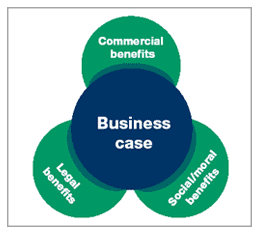|
Components of CSR
Corporate Governance: Within the ambit of corporate governance, major issues are accountability, transparency and conduct of conformity with the laws which enable the company to realize its corporate objectives, protect shareholder rights, meet legal requirements and create transparency for all stakeholders.
Workplace & labour relations: Human resources can help in improving the workplace in terms of health and safety, employee relations as well as result in a healthy balance between work and non-work aspects of employees' life.
Affirmative action/good practices: Equal opportunity employer, diversity of workforce that includes people with disability, people from the local community etc., gender policy, code of conduct/guidelines on prevention of sexual harassment at workplace, prevention of HIV/AIDS at workplace, employee volunteering etc. are some of the good practices which reflect CSR practices of the company.
Supply Chain: The business process of the company is not just limited to the operations internal to the company but to the entire supply chain involved in goods and services.
Customers: With increased awareness and means of communication, customer satisfaction and loyalty would depend on how the company has produced the goods and services, considering the social, environmental, supply-chain and other such aspects.
Environment: Merely meeting legal requirements in itself does not comprise CSR but it requires company to engage in such a way that goes beyond mandatory requirements and delivers environmental benefits.
Community: A major stakeholder to the business is the community in which the company operates. The involvement of a company with the community would depend upon its direct interaction with the community and assessment of issues/risks faced by those living in the company surrounding areas.
Business Case for CSR
 The benefits of implementing CSR strategies are largely difficult to quantify. Therefore, it is not surprising that a large number of arguments encouraging businesses to be socially responsible are based on 'beyond-financial-benefits' perspectives. It has been our experience too, that while developing their CSR strategy corporations are not aiming at short-run financial returns.
This is not to suggest that CSR has no business case and is limited to 'feel-good', voluntary and charitable efforts. In many companies CSR functions are based within the human resources or public relations departments and in some case, in a separate unit. However, in the best of CSR efforts the concept is so well integrated into the key business activities of the company that the CSR values are operationalised through direct everyday work of the employees.
Companies that commit to developing a comprehensive CSR strategy can expect benefits from a number of possible positive outcomes, including:
The benefits of implementing CSR strategies are largely difficult to quantify. Therefore, it is not surprising that a large number of arguments encouraging businesses to be socially responsible are based on 'beyond-financial-benefits' perspectives. It has been our experience too, that while developing their CSR strategy corporations are not aiming at short-run financial returns.
This is not to suggest that CSR has no business case and is limited to 'feel-good', voluntary and charitable efforts. In many companies CSR functions are based within the human resources or public relations departments and in some case, in a separate unit. However, in the best of CSR efforts the concept is so well integrated into the key business activities of the company that the CSR values are operationalised through direct everyday work of the employees.
Companies that commit to developing a comprehensive CSR strategy can expect benefits from a number of possible positive outcomes, including:
- Enhanced brand value and corporate image
- Improved customer loyalty
- Reduction of risk as a result of clearer grasp of positions taken by stakeholders
- Gaining an informal social license, facilitating business in sensitive environments
- Development of a better work culture within the organisation and increased employee satisfaction.
|





|